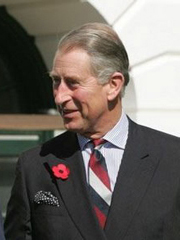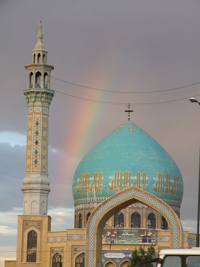
A Right Royal Interpretation?
Addressing 800 Islamic scholars at Cairo’s Al-Azhar University earlier this year,1 Prince Charles lamented the continuing ‘religious conflict’ arising out of ‘misunderstandings’:
‘My heart is heavy from witnessing the never-ending death and destruction … Images of communities torn apart by religious conflict are deeply harrowing—from Bosnia to Baghdad, from Chechnya to Palestine—evidence of just how far misunderstandings have continued and escalated. Violence, so often justified in the name of religion, effects a terrible hardening of hearts. What good can possibly come of all this?’2
This was part of ‘an impassioned speech’—as the Prince’s own website described it3—calling for ‘greater understanding between Islam and the west’.
This has in fact been a favourite theme for the Prince for some years. He gave his first speech on the subject in 1993 at the Oxford University Centre for Islamic Studies as the centre’s Patron. In recognition of ‘his work on interfaith understanding’, Al-Azhar University has awarded Prince Charles an honorary doctorate—the first to be awarded to a non-Muslim.
Christians around the world would readily understand why the future Head of the Church of England would be moved to speak out publicly against violence and destruction (e.g. Matthew 5:9), and laud him for doing so.
But many would be grieved to hear what the Prince views as a key to curbing ‘misunderstandings’. Speaking at length about ‘the great Abrahamic faiths’ (Judaism, Christianity and Islam) he warned that when all we can see in their respective ‘sacred texts’ is ‘simple certainties’, then this leads to hatred and violence—in short, extremism. Instead, he praised moderation, which, he said, ‘marked Islam in its great ages’.
And the key factor there, said the Prince, lay in correctly interpreting the meaning of the ‘sacred text’ (be it ‘the Koran, the Hebrew Bible, the New Testament’):
‘[W]hat was so distinctive of the great ages of faith was that they understood that, as well as sacred texts, there is the art of interpretation of sacred texts—and this is a difficult and subtle art that gave rise in Islam to great principles of interpretation and great schools of jurisprudence.
‘Between the text and the meaning of the text—between the meaning of God’s word for all time and its meaning for this time—falls the act of interpretation. It was Islam’s greatness to understand this in its full depth and challenge. And this is what you, at this great and historic institution, can give not only to Islam, but, by example, to all the other children of Abraham.
‘Today, too often, there seems to be a tendency to read texts as if they needed no interpretation, as if we could read the meaning on the surface. That does violence to the Divine word, and violence to the word eventually leads to violence to the person, and to the world.’
Whoa! What was that again? ‘A tendency to read texts as if they needed no interpretation, as if we could read the meaning on the surface.’ The Prince appears to be saying that we can’t read the text as if it had a straightforward meaning. I.e. the words might mean something different from what we think they say on the surface. Of course, we would agree that there are principles of proper interpretation, which involve what the original author intended. Not every part of the Bible is intended to be read literally, for instance. See CMI answers philosophy/religion professor on biblical exegesis and the problem of evil, also Should Genesis be taken literally? But that is not the same as saying that one can evade or gloss over the plain meaning of a text at will. If that were so, then Scripture could never communicate any sort of truth.
The Prince echoed his Cairo comments in a more recent speech at Fatimah Jinnah University, Pakistan:
‘In a secular age you hear again and again the accusation that religion is the cause of so much misery and strife in the world. However, religion itself is not the problem—it is surely human misinterpretation of the sacred texts handed down to us that can lead to such appalling misunderstanding and hatred. A too literal reading of the texts, for instance, can so easily obscure the inner, symbolic meaning contained within them.’4
I can well understand why the Prince would not want his Muslim hearers to live out a ‘literal’ reading of Koran, especially in regard to the verses that explicitly call Muslims to kill Jews, Christians and all other non-Muslims; e.g.:
- ‘… then fight and slay the Pagans wherever ye find them, and seize them, beleaguer them, and lie in wait for them in every stratagem (of war) …’ (Koran 9:5). [As the Japanese kamikaze pilots showed, suicide crash-landing into enemy targets can be a considerably destructive ‘stratagem (of war)’—and even more strategic when you use the enemy’s own planes as per September 11.]
- ‘… I will instill terror into the hearts of the Unbelievers: Smite ye above their necks and smite all their fingertips off them.’ (Koran 8:12) [Vide the gruesome beheadings of kidnapped Westerners in Iraq recently, often filmed and released to Al-Jazeera for public broadcast.]
Despite the noble motive behind the Prince’s call to Muslims to not read the Koran ‘literally’, unfortunately his argument is a tangled minefield of divided thinking. It would mean that we could never know whether any text means what it says.
And if Christians were to apply that standard to the Bible, Christianity would soon degenerate (as it has in some quarters) into some amorphous ‘it-can-be-whatever-you-want-it-to-be’ religion, rather than defining THE way, THE truth and THE life (John 14:6). For if the One by whom and through whom and for whom all things were made (Colossians 1:16) did not use words that could be understood in a straightforward way by fishermen and tax collectors (people who use such language in their everyday lives), then the Gospel is a fraud (John 16:29). And if we can’t trust fishermen and tax collectors to interpret the Creator’s words correctly (which would mean we’d have to remove Matthew’s Gospel account and Peter’s 1st and 2nd epistles, at least, from the Bible) then whose interpretation can we trust?
Actually, there are good reasons for emulating the Bereans (Acts 17:11) and thus for not accepting Prince Charles’s advice. And other comments the Prince has made, when we read them in a straightforward manner (i.e. the way I’m sure he intended, without ‘interpretation’), seem to go dangerously close to saying that ‘all religions are equal’, in direct opposition to Scripture (e.g. John 14:6). For example, in the Pakistan speech, the Prince said:
‘And wisdom tells us that all the great religions provide a different path to the ultimate source of Truth—as if we were all stationed at various points around the circumference of a circle and following separate radii that lead to the sacred centre.’4
Of course, such an approach is not new, but one could be forgiven for thinking that someone born and trained to be the future Head of the Church of England would be a ‘Defender of the Faith’ (not any faith).
The evolutionary basis of ‘universal religion’
Note that the ‘all religions are equally valid’ line has its roots in the secular evolutionary premise that as man has evolved, so too have religious ideas and traditions. I suppose one should not be surprised that the Prince would have such a view, given that he is on record as having endorsed the teaching of evolution:5
‘But it is essential to spread the basic knowledge of anthropology far wider for a whole multitude of reasons. Let me outline some of the ones I think are important. Reason number one is that the more people can be assisted to appreciate and understand their own social behaviour, the more they can be assisted to develop a civilised, tolerant approach to human problems through greater self-analysis and the better and more healthy our society will be. We should all have a basic grasp of the elementary principle of evolution and our consequent close relationship with the rest of the animal kingdom; in some instances not close enough, for some animals seem manifestly more capable of conducting themselves sociably than many human beings.’ [emphasis added.]

As we’ve pointed out many times, the God of the Bible and evolutionary theory cannot be reconciled (see our response to a feedback enquiry ‘What’s the problem with theistic evolution?’). And aside from the biblical issues regarding the Prince’s claim that the ‘holy texts’ cannot be read ‘literally’ (i.e. in a straightforward manner—see our feedback response ‘Is CMI in a dizzy?’), one has to question the likely effectiveness of the Prince’s strategy. Why would any Muslim take the slightest heed of a non-Muslim counselling Muslims on how to read their ‘holy text’?
Admittedly, the Prince is not alone in naively trying to tell Muslims how they should interpret the Koran—it has become a common mantra of Western leaders and scholars since September 11, 2001.
Alas, in the days following the collapse of the twin towers of the World Trade Centre, many Western leaders publicly espoused the line that Christianity and Islam were both ‘Abrahamic faiths’, whose followers worshipped the same ‘One True God’—a theme echoed by Prince Charles in both his Cairo and Pakistan speeches this year. However, the real God of Abraham (and of Moses and Noah, Enoch and Job)6 is not the God of the Koran, as we’ve earlier explained (see ‘The Koran vs Genesis’)—and the Koran is not the ‘Divine Word’. And no amount of ‘interpretation’ can change that. If ever there was a time for Christians to boldly stand up and make this plain, that time is now.
References
- I.e., March 2006, while on a tour of Egypt and Saudi Arabia with the Duchess of Cornwall.
Return to text. - The Prince of Wales—Speeches, A speech by HRH The Prince of Wales titled ‘Unity in Faith’ at Al-Azhar University, Cairo, Egypt, 21st March 2006; <http://www.princeofwales.gov.uk/speechesandarticles/
a_speech_by_hrh_the_prince_of_wales_titled_unity_in_faith_at_94.html>, 13 December 2006.
Return to text. - The Prince of Wales—News & Events, NEWS 21.03.2006: The Prince delivers an impassioned speech calling for greater understanding between the three great Abrahamic faiths of Islam, Judaism and Christianity at the Al-Azhar University, <www.princeofwales.gov.uk/newsandgallery/news/
hrh_calls_for_greater_understanding_between_the_abrahamic_fa_746.html>, 22 March 2006.
Return to text. - The Prince of Wales—Speeches, A speech by HRH The Prince of Wales at Fatimah Jinnah University, Pakistan, 31st October 2006; <http://www.princeofwales.gov.uk/speechesandarticles/
a_speech_by_hrh_the_prince_of_wales_at_fatima_jinnah_univers_2005852722.html>, 13 December 2006.
Return to text. - The Prince of Wales—Speeches, A speech by HRH The Prince of Wales at the Royal Anthropological Institute’s Centenary Dinner, London, 3rd November 1973; <http://www.princeofwales.gov.uk/speechesandarticles/
a_speech_by_hrh_the_prince_of_wales_at_the_royal_anthropolog_1334400698.html>, 13 December 2006.
Return to text. - Cross, J.R., All that the Prophets have Spoken, GoodSeed International, Durham, Ontario, Canada, 2001.
Return to text. - cf. 2 Timothy 3:16, 2 Peter 1:20

Readers’ comments
Comments are automatically closed 14 days after publication.